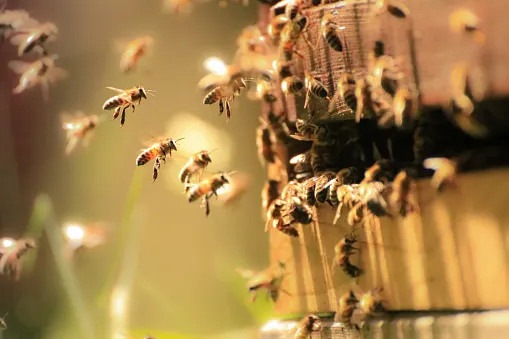
Canadian scientists closer to solving honeybee die-off mystery
Scientists are developing new methods to measure the health of honeybees in order to prevent mass die-offs.
One out of three mouthfuls of food consumed comes from the bee pollination. Scientists say bees generate $5.5 billion to our agro-economy.
Bees are an integral part of our daily life - we need them to pollinate our crops and to provide honey.
But, there is no question, bees are dying at an alarming rate and, what's worse, beekeepers are stumped as to why.
Researchers say about one in every two Canadian colonies dies for no apparent reason.
“There is no equivalent to a bee vet where you take your bees when they’re sick and they tell you it’s got that problem," says Amro Zayed, an associate professor at York University. "Often beekeepers will just visually inspect the colonies and if the colony looks good, then everything is well.”
SEE ALSO: Why these giant bugs thrive in fall
That is - until now. Zayed and Professor Leonard Foster of the University of British Columbia are leading a $10 million project to develop a health diagnosis tool for bees. The project, supported by Ontario Genomics and Genome Canada, begins in October 2019 and spans over four years.
“We are essentially looking at the bees internal physiology and using that to give us clues about the specific stressors that are affecting bees,” explains Zayed.
The team will be assessing bees from coast to coast to ensure a wide representation of the Canadian honey bee population.
“We know that there are many stressors that affect honey bee health: parasites, pathogens, poor nutrition, pesticides etc. But not all of them are always acting on the same population at the same time. You know the corn belt in Ontario is going to experience a whole different set up of health stressors than a colony that’s up north near Hudson Bay, then a colony that's in blueberry fields in BC.”
Traditionally the only method to finding out why a colony parished is in a post-mortem diagnosis. This research will provide a real-time diagnosis for beekeepers.
“By doing these tests before a colony dies, beekeepers are going to be able to know what the stressors are and respond to them and prevent colony decline,” said Zayed.
“We’re trying to identify stressors by looking at the bees’ physiology. So for example, if a bee is infected by a virus it’s going to upregulate or turn on specific genes in its immune system and, by knowing which genes are being turned on, we could guess or make a really good prediction about the actual pathogen or virus that is affecting a bee.”
The goal of the project is to create a system where beekeepers can send their live samples for biomarker testing and in return, receive a health assessment. Beekeepers will also get information about how to better manage their colonies based on the findings.
Twenty- two researchers from across Canada, including some from Alberta, Manitoba, other institutions in Ontario and Quebec, will take part in the project.
--
Have a story idea? Tweet it to Marta, @martaczur.
Thumbnail image source: Getty Images










